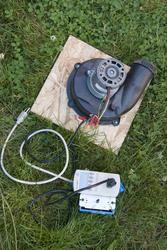 One of the big lessons from the other stove is that airflow is key. I recently had the furnace in my house replaced and I had the guys leave the old one behing so I could scavenge for parts. One of these parts is a blower fan.
One of the big lessons from the other stove is that airflow is key. I recently had the furnace in my house replaced and I had the guys leave the old one behing so I could scavenge for parts. One of these parts is a blower fan.
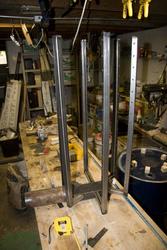 Next, I needed a way to distribute the air into the combustion chamber (how’s that for technical jargon?) If you look closely or click on the image for a larger view, you’ll see that I’ve drilled holes on one side of each of the tubes. This is also to cause a swirling. I want the air to move around as much as possible before leaving.
Here are some shots of the barrel from below. This should give you a better idea of what’s going on.
Next, I needed a way to distribute the air into the combustion chamber (how’s that for technical jargon?) If you look closely or click on the image for a larger view, you’ll see that I’ve drilled holes on one side of each of the tubes. This is also to cause a swirling. I want the air to move around as much as possible before leaving.
Here are some shots of the barrel from below. This should give you a better idea of what’s going on.
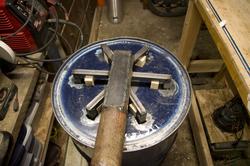 next
next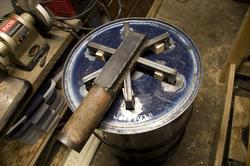 And here’re a couple inside shots.
And here’re a couple inside shots. 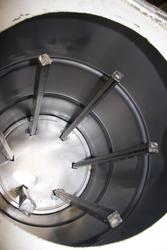
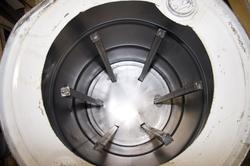 Next, I created some forms so I could line the inside with a cement, sand, perlite mix. The perlite is to make it a bit insulating.
Next, I created some forms so I could line the inside with a cement, sand, perlite mix. The perlite is to make it a bit insulating.
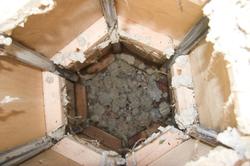 Instead of removing the forms, I just burned them out.
Instead of removing the forms, I just burned them out.
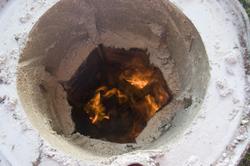 Here are some shots of the stove in action.
Here are some shots of the stove in action.
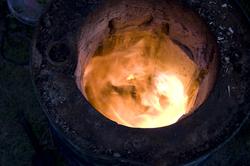
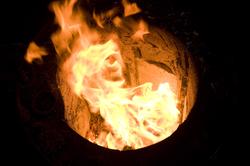
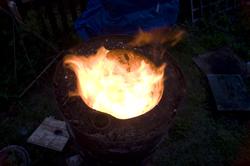
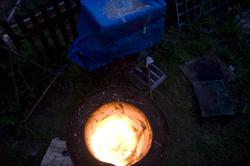
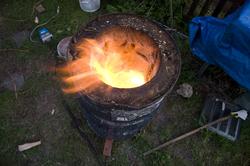
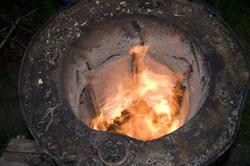
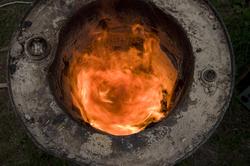
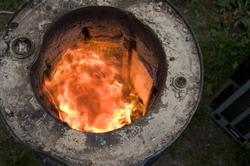
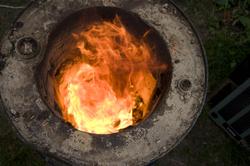
A last optimization on the stove is a lid. I haven’t tried it yet, but I think it will help it burn even better.
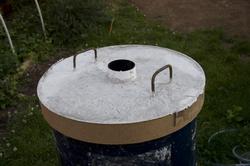
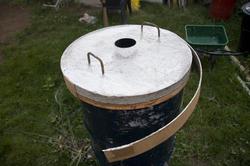
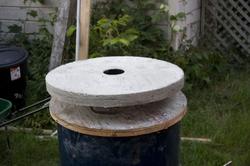 Stove performance
So far, I’ve been very pleased with how the stove operates. I’ve been able to burn sawdust, woodchips, firewood and construction scraps. The main issue is with the sawdust. The problem there is that as the upper layers of sawdust turn to ash, it seals away the unburned sawdust. The fire dies down a bit and then when I stir it a bit, it fires back up. Figuring out a way to make it into blocks would be neccessary to really make it work with that kind of fuel.
Wood and woodchips burn pretty good though. I’m looking forward to seeing how the lid does.
Stove performance
So far, I’ve been very pleased with how the stove operates. I’ve been able to burn sawdust, woodchips, firewood and construction scraps. The main issue is with the sawdust. The problem there is that as the upper layers of sawdust turn to ash, it seals away the unburned sawdust. The fire dies down a bit and then when I stir it a bit, it fires back up. Figuring out a way to make it into blocks would be neccessary to really make it work with that kind of fuel.
Wood and woodchips burn pretty good though. I’m looking forward to seeing how the lid does.